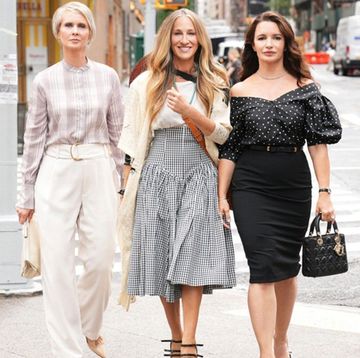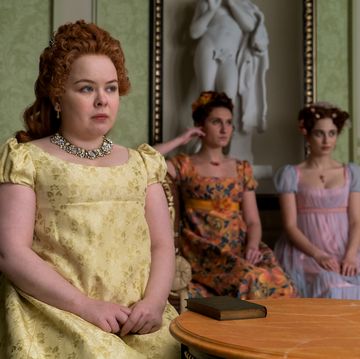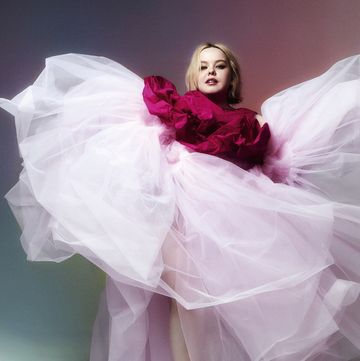When the Harvey Weinstein scandal - as it's so commonly referred to - broke in 2017, the size of the shockwave was due, in no small part, to the high-profile status of some of his alleged victims.
Gwyneth Paltrow, Ashley Judd, Rose McGowan... the list of famous women who have come forward with accusations of sexual abuse or harassment against the movie mogul is staggering.
And there's no denying that these A-Listers have risked their careers and more, in order to have the film industry's former King deposed. As well as inspiring the revival of Tarana Burke's #MeToo movement and starting the Time's Up fund, they were instrumental to the legal proceedings. Weinstein is currently awaiting a criminal trial, expected to begin in January.
However, thanks to a new book, we've come to understand that these A-list accusers were just the couture-draped tip of the iceberg. Existing behind the scandal's Hollywood face, are a number of other victims. And though they might be less prominent to the naked eye, they are absolutely key to the story.
In particular, it is important to understand the story of Laura Madden, from Ireland, who was the first woman prepared to go on record about Weinstein's behaviour, which made her the lynchpin of the New York Times exposé. A lone voice in a sea of silence, she risked everything to change the course of history.
'She Said'
The first public allegations against Weinstein were reported by two female journalists at the New York Times.
Jodi Kantor and Megan Twohey later received the Pulitzer Prize for journalism for their brave exposal. The writers have now revealed further details of their lengthy investigation in a new book, She Said: Breaking The Sexual Harassment Story That helped Ignite A Movement, which is also being made into a film.
As well as providing context about well-known actresses' involvement, in the book they take great pains to give due credit to the other women who were responsible for toppling the media and film mogul.
'There is this cultural image of the Weinstein victim as a famous actress in an evening gown,' Kantor tells ELLE UK when we meet in London. 'And that is certainly true, but there was a second strand of women who were crucial to breaking the story.'
The NDA Trail
One of these women is Zelda Perkins - a British woman and formerly Weinstein's assistant - who Kantor thanks for being the 'first to show us this crumbling old settlement document' - aka a Non-Disclosure Agreement (NDA) - which gave details of her contractual silence on Weinstein matters.
It was a clue that kicked off the investigation. The reporters soon learned that Weinstein and his powerful team of lawyers had used many of these, to settle with women who alleged abuse and harassment.
In 1998, Perkins signed an NDA and accepted a settlement, after raising concerns when a colleague confided in her that Weinstein had tried to sexually assault her. Perkins has since appeared in front of MPs in Westminster to warn of the potential for misuse of NDAs.
'[The document] helped illustrate the degree of the cover up and the fact that Weinstein had paid women off to keep these accusations silent,' says Kantor. 'We [Kantor and Perkins] sat here in a restaurant in London and she showed me those papers at tremendous legal and personal risk to herself.'
The woman who Perkins was protecting did not go on the record in the initial New York Times article, she didn't feel ready. But, for the book, she has.
London-born Rowena Chiu - also a former assistant to Weinstein - had worn two pairs of tights for protection when she attended Weinstein's hotel room in the evening, during the 1998 Venice Film Festival. On one night, she claims, Weinstein harassed her with sexual requests - including massages, a bath, and more - before repeatedly touching her, parting her legs and telling her it would be 'over in one thrust', in her words, he 'tried to rape' her.
Weinstein has denied this encounter and denies all allegations of nonconsensual sex.
The Story Of Laura Madden
Even more astonishing, if it's possible, is the bravery of Laura Madden.
Madden, from the small town of Monoghan, Ireland, worked on the production crew for a Weinstein movie in 1992. She claims that when attending Weinstein's Dublin hotel room, he - wearing a bathrobe - asked for a massage, instructed them both to undress, masturbated over her and suggested a shower together.
When Madden began crying in the shower, Weinstein allegedly became annoyed and left the bathroom. After locking herself in for a while out of fear, Madden says she eventually grabbed her clothes and left. (Weinstein has denied this account).
Madden - who had since left the movie industry and who has been living a quiet life in Wales - was the first woman to agree to go on the record with her allegation.
'When Laura first told me her story, she said she had never shared it publicly,' Kantor explains. 'Over the following weeks and months, she began to build up her courage, especially when she saw that we were beginning to document a wider pattern.'
'Just before publication,' says Kantor, 'before Ashley Judd joined, she was actually the only woman we had on the record.'
A further astounding detail, is that at the time of reporting, Madden had breast cancer and was awaiting a second mastectomy. Despite being in the throes of a gravely stressful period, she was prepared to put her life further in jeopardy, allowing her Weinstein accusations to be made public.
'Being the sole women on the record for a story like this is so unbelievably difficult to begin with,' Kantor says. 'And we asked her to do it as she was going under the knife for this very difficult, very personal surgery. It seemed like way too much to ask anyone but, then again, we couldn't afford to lose her because she was the one woman we had on the record.
'To this day, I don't think many people know that that personal decision ended up having historic ramifications for the rest of us,' Kantor reflects.
These less visible Weinstein accusers didn't have personal lawyers or crisis-management teams to deploy, nor did they have the financial resources to fight back if Weinstein chose to level a counterclaim. They were risking everything.
The Road To Exposé
Twohey explains how she came to realise that ordinary women who worked for Weinstein as assistants - like Perkins, Chui and Madden - could also have been victims.
'The fact that Paltrow opened up to us was really significant,' Twohey explains. 'She had been Weinstein's biggest star and was seen as the first lady of Miramax, in some ways she had this untouchable air about her.
'We had this sense that, if she had been one of his alleged victims, then probably nobody was immune and there were likely countless women who had been preyed on by him. It was motivating.'
Not wanting her celebrity status to distract from the story in it's nascent stages, Paltrow - who claimed Weinstein sexually harassed her when she was 22 - declined to be included in the first article. But for a year or so before publication, the Goop founder provided the journalists with sources she'd reached out to and information.
The road to exposing the scandal was long. It took months. Though the reporters had heard the rumours, they couldn't just print them. They needed cold, hard, indisputable evidence.
'Part of what we want people to remember about this whole story is that facts can actually drive social change and they can cause people to act and to feel compassion and evaluate things in real life.
'But for that to happen,' Kantor says, 'the facts have to be airtight.'
Thorough reporting required that they alert Weinstein to the case they were mounting against him, giving him the right to respond.
Weinstein made several visits to the NYT offices throughout the reporting (one particularly shocking moment, documented in the book, involves him allegedly leaning in to Kantor to say he wasn't that bad, clarifying: 'I'm worse').
'What was chilling about it,' reflects Kantor. 'Was that there was this sardonic tone to it. It was almost like he was joking, but it was such a dark joke.'
After hearing so much about his character from sources, the journalists found that his behaviour was pretty true to the descriptions they'd been given.
'Many people told us he liked to keep people off balance. He had a combination of menace, flattery and humour that was always meant to destabilise.'
'We were never scared of him,' Twohey adds. 'The more that we got glimpses of his threats, intimidation and bullying, the more motivated we were to cross the finish line, publish our findings and expose him for who he was.'
Where We Stand Now
Their groundbreaking story was the first (albeit giant) toppling tile that set off a long domino-chain of events.
The revival of the now ubiquitous #MeToo movement has seen many predators exposed and held to account.
However, there has been some debate about the ability to effect long-lasting change.
'Me Too is an example of vast social change in our time,' Kantor refutes. 'The old rules on sex and power have been swept away, but it is not clear that we have come up with new ones.'
There's also the issue of how best to protect the women whose worlds were upended when they went public with secrets they'd kept for years. Though Twohey wasn't scared for her personal safety, she tells us she was concerned for her sources, especially when they had to notify Weinstein of the full allegations.
Twohey knows all too well what can happen when you put a powerful man on blast. In 2016, she reported on sexual assault allegations against Donald Trump.
'I was battered by the reporting on Trump,' Twohey says. 'While there were people who supported those women, they also suffered a lot of attacks. Trump called them liars and threatened to sue them. He screamed at me and called me a disgusting human being. Then I helped cover his election [victory], so I will confess I had felt pretty bruised by that experience.'
For Kantor, the responsibility of telling these women's stories sits with her 'every day'.
'[This responsibility] is part of why we wrote the book,' the reporter explains. 'We never expected to be in this position. We were just doing our jobs working on a particularly tough story when this all happened.
'Our book is a way of creating a permanent lasting historical record of what happened. We want people to hear the women in their own words. We want other people to see what we've seen.'
Like this article? Sign up to our newsletter to get more articles like this delivered straight to your inbox. SIGN UP

Olivia Blair is Entertainment Editor (Luxury) at Hearst UK, working across ELLE, Esquire and Harper's Bazaar. Olivia covers all things entertainment and has interviewed the likes of Margot Robbie, Emma Stone, Michaela Coel and Ryan Gosling over the years.



















